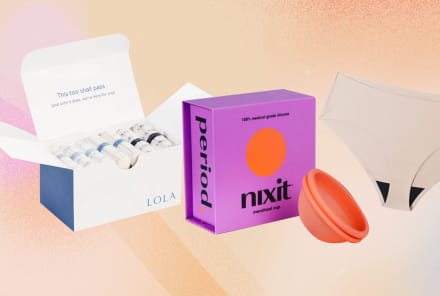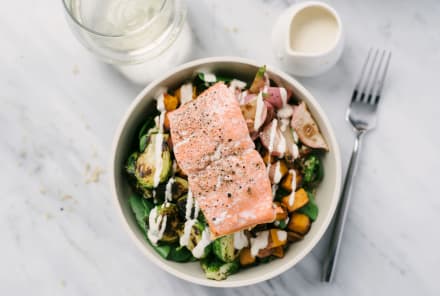Advertisement
3 Things That Are Spiking Your Toxic Load & How To Protect Your Liver


The liver is our body’s primary detox organ (although it does get some help from the digestive system, lungs, and kidneys). It works 24/7 to help filter harmful chemicals from our system. The problem is, the liver can get bogged down when your toxic load gets too high—and this is the time of year you're most exposed to multiple pollutants from multiple sources in a relatively short period.
These are three of the most common (and avoidable) contributors spiking your toxic load right now, how to decrease your exposure to them, and what to do to protect your liver year-round.
Indoor air pollution
While candles, fireplaces, and space heaters are used to create a cozy and inviting atmosphere, they also release volatile organic compounds, soot, and even carbon monoxide into the air.
These pollutants can easily build up with poor ventilation and closed windows—meaning you’re continuously breathing in contaminated air.
How to decrease exposure: There are a few ways to clean the air of your space and lower your indoor air pollution exposure. You can invest in an air purifier (like this editor-approved one) for high-trafficked rooms to filter out smoke, dust, and other contaminants. You can also open your windows for a minute or two daily—more than a crack—to give your home’s air a quick refresh. Lastly, if you’re a candle enthusiast, consider switching to a candle warmer versus burning the wick—to avoid the cascade of chemical reactions that create those volatile compounds.
Alcohol intake
Holiday and New Year’s festivities are often accompanied by higher-than-usual alcohol consumption. So, someone who only indulges in one drink a week may find themselves sipping on two or more drinks nightly for weeks.
This places extra strain on your liver, as the organ is responsible for The liver is responsible for breaking down about 90% of the alcohol1.
Not to mention, drinking may leave you feeling groggy and unmotivated the following day.
How to decrease exposure: While most people don't have to give up alcohol entirely, it's important to be mindful of your consumption. Each time you do drink, try sticking to just one beverage that day. After enjoying your drink of choice for the evening (or skipping it altogether), consider switching over to a mocktail, a seltzer water with lime, or a tasty alcohol alternative. For those wanting to significantly lower their alcohol intake, you can always partake in Dry January.
Microplastics
Microplastics are everywhere, especially in common household items. And a recently published report found that black plastic2 used in many carryout containers and cooking utensils (like slotted spoons) have notable levels of flame retardants from plastic recycling. When heated or exposed to moisture, these chemicals can leech into your meal (yikes!).
How to decrease exposure: It’s best to avoid black plastic when possible in your kitchen. Look for wood serving utensils, opt for glass storage containers, and never heat plastic in the microwave (even if it says it’s “safe”).
Add this to your routine to further support liver detox
While these steps can help minimize your toxic load, there’s no way to eliminate all toxins from your life. And that’s when habits that help bolster your body’s natural detox system come in, including targeted supplements.
mindbodygreen’s liver detox+ is formulated with five antioxidants to support the liver (and all detox-involved organs) by binding, filtering, and removing toxins, as well as combating oxidative stress as internal stressors present themselves in the body.*
These antioxidants include:
- Glutathione: Your body makes glutathione from amino acids (cysteine, glycine, and glutamine), but it's also available in supplements. liver detox+ provides Setria® glutathione, which has been clinically shown to raise glutathione levels in the body and fend off harmful free radicals.*
- N-acetyl cysteine (NAC): NAC is a precursor for internal glutathione production. Supplementing with NAC helps replenish glutathione stores to support the resilience and repair of liver cells.*
- Milk thistle: This herbal extract helps protect the liver by targeting the free radicals produced as a result of detoxification processes.*
- Selenium: Selenium is a mineral with purifying capabilities that are pivotal for cellular and whole-body detoxification.*
- Vitamin C: This vitamin is most recognized for its immune benefits, but it also helps restore glutathione and protect liver and kidney function.*
The body needs a regular source of these bioactive compounds—beyond what diet alone provides—so it can effectively eliminate toxins before they become a burden.
The takeaway
Unfortunately, activities and habits that coincide with the colder months (like lighting candles, basking in a warm fire, or reheating leftovers) also increases our toxic load. While certain swaps can reduce the burden on your body, daily habits like liver detox+ help your liver function optimally all-year round—even during times you’re exposed to a higher degree of contaminants.
Watch Next
Enjoy some of our favorite clips from classes
Enjoy some of our favorite clips from classes
What Is Meditation?
Mindfulness/Spirituality | Light Watkins
Box Breathing
Mindfulness/Spirituality | Gwen Dittmar
What Breathwork Can Address
Mindfulness/Spirituality | Gwen Dittmar
The 8 Limbs of Yoga - What is Asana?
Yoga | Caley Alyssa
Two Standing Postures to Open Up Tight Hips
Yoga | Caley Alyssa
How Plants Can Optimize Athletic Performance
Nutrition | Rich Roll
What to Eat Before a Workout
Nutrition | Rich Roll
How Ayurveda Helps Us Navigate Modern Life
Nutrition | Sahara Rose
Messages About Love & Relationships
Love & Relationships | Esther Perel
Love Languages
Love & Relationships | Esther Perel



















